Nothing is more disconcerting than arriving at your vehicle only to see a giant puddle of liquid beneath it. Why would your car be dripping water? We've investigated this matter and have a stockpile of informative answers ready for you!
The main reason behind water leaking from a car is due to condensation from running the air conditioning system. This can also occur near the exhaust pipe. Both situations are often normal and usually nothing to worry about. However, if the liquid is thick and dark, you are dealing with an oil leak- not water. In addition, when the puddle looks colored or smells sweet, it is most likely coolant instead.
So, how do you tell which fluid is leaking? Can you drive a car with a water leak? How do you stop a car engine from dripping water? Keep reading to learn all about what that mystery puddle in your driveway is and what to do about it!
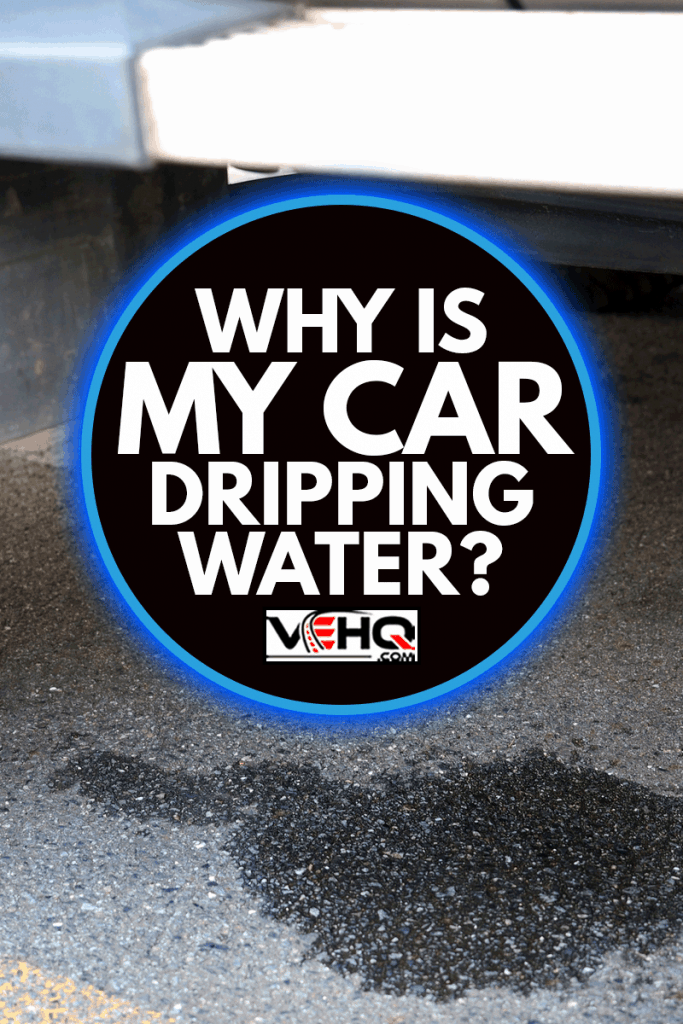
Identifying the leaking liquid
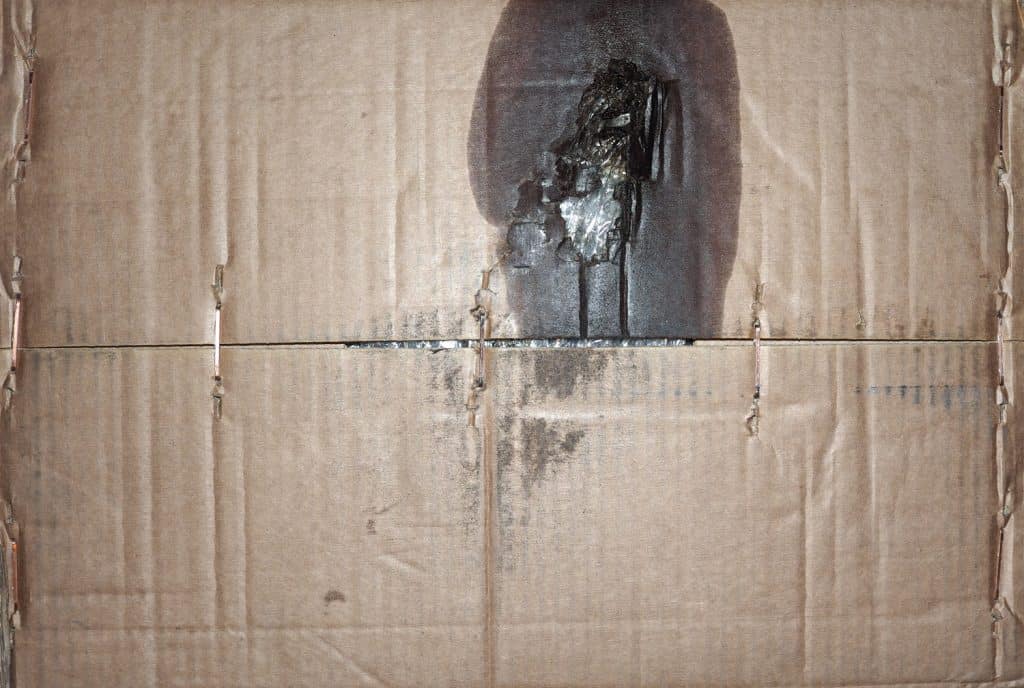
When you find that your vehicle is dripping fluid, the first step to take is to figure out exactly what it is. It's definitely not always water! If you don't know what you're working with, it's almost impossible to move forward with the why.
It's sometimes difficult to do this against the background of concrete. So, go ahead and grab a paper towel, piece of white paper, or chunk of cardboard. Place it directly under the leak for a sample that's easier to identify. We'll wait here.
Now that you have that, let's narrow down the results!
Water
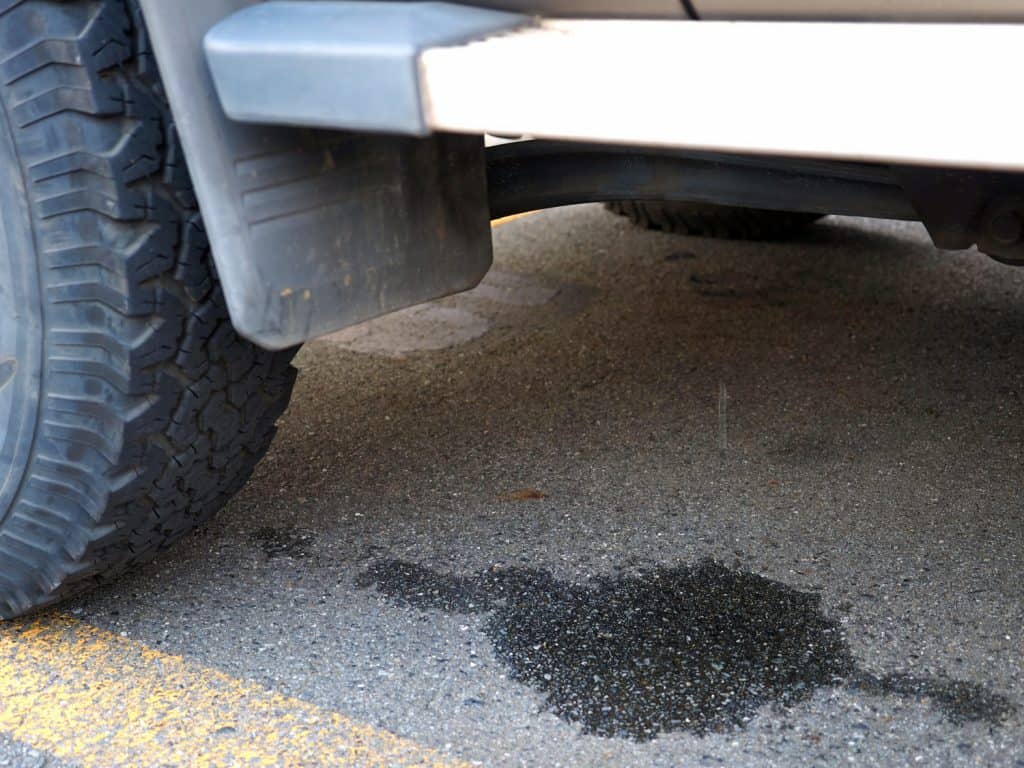
Generally, if there is no color or smell to the liquid, it's most likely water. When this is the case, there is little to be concerned about. As we previously touched on, leaking water is almost always condensation from either the AC or exhaust system. This is completely normal and usually doesn't require any immediate fix. Don't be nervous about it unless it shows up with other symptoms, such as loss of cooling or leaking inside the vehicle.
That being said, if water near the exhaust pipe is accompanied by a cloud of white smoke, you'll want to get your car to the shop. These are signs of a blown head gasket, which is a serious issue that allows fluids to mix that shouldn't. Attempting to continue driving in this condition is dangerous and can ruin your engine.
Oil
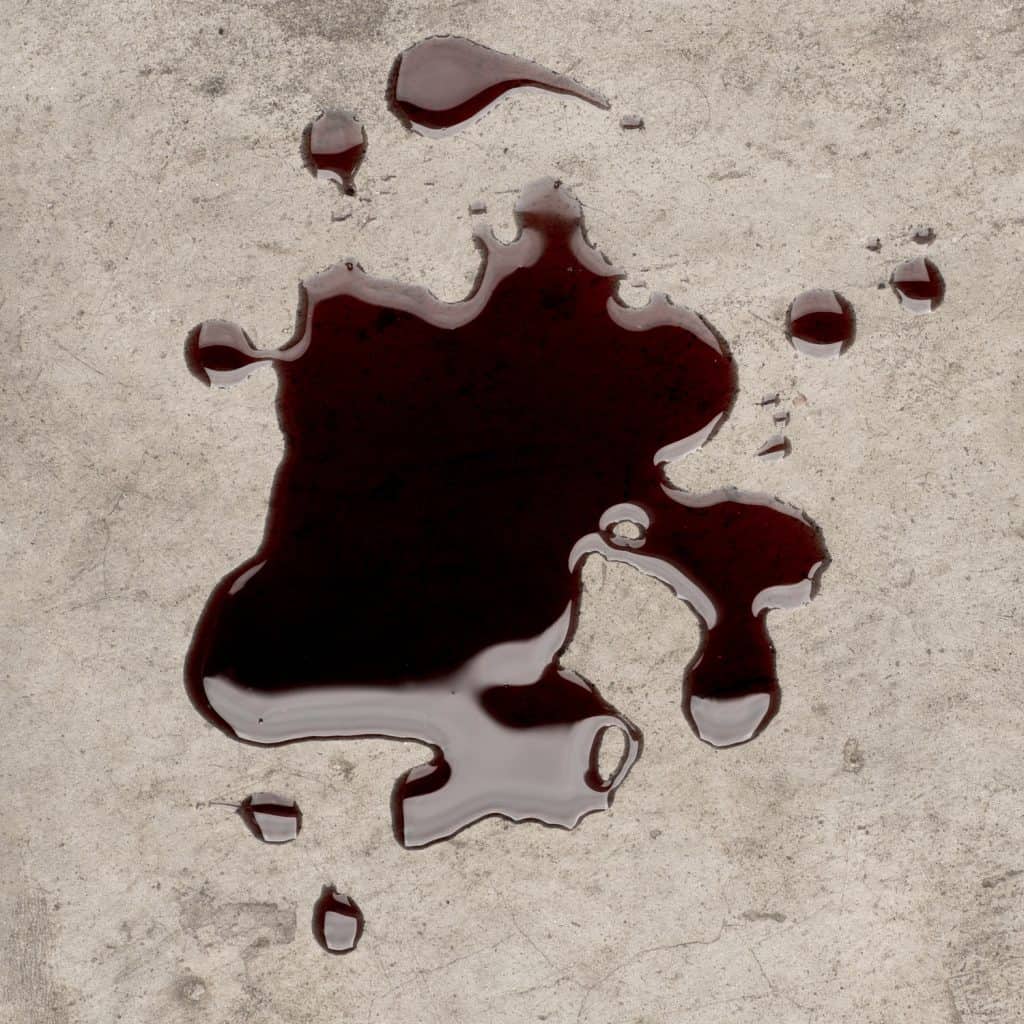
Oil is fairly easy to identify because of its super-thick consistency and dark color. It's also extremely hard to clean up and often stains the concrete or asphalt. If this sounds like what you have, you're probably dealing with an engine oil leak.
However, some lubricants and brake fluid can resemble the color of oil, as well. If you're having trouble telling for sure, consider the location. Oil will leak under the engine while brake fluid should be closer to a wheel. A trained mechanic should be consulted to tell you more.
Coolants & other fluids

If your leak is colorful or has a sweet smell, it could be a coolant or other fluid. They come in a wide variety of tints and colors, such as yellow, green, blue, red, and orange. The warmer colors tend to belong to transmission and power steering fluids, as well as radiator coolant. Cooler colors are typically seen in relation to windshield wiper solutions and antifreeze.
Coolants, in particular, are used to help regulate temperatures in the engine. If you suspect the warmer colors specifically, make an appointment with your mechanic.
In addition, be vigilant in dealing with antifreeze leaks. The main ingredient, ethylene glycol, is toxic to humans and animals. It has an attractive sweet taste that is tempting to pets and should be cleaned up and corrected quickly.
What is the water dripping from my car?
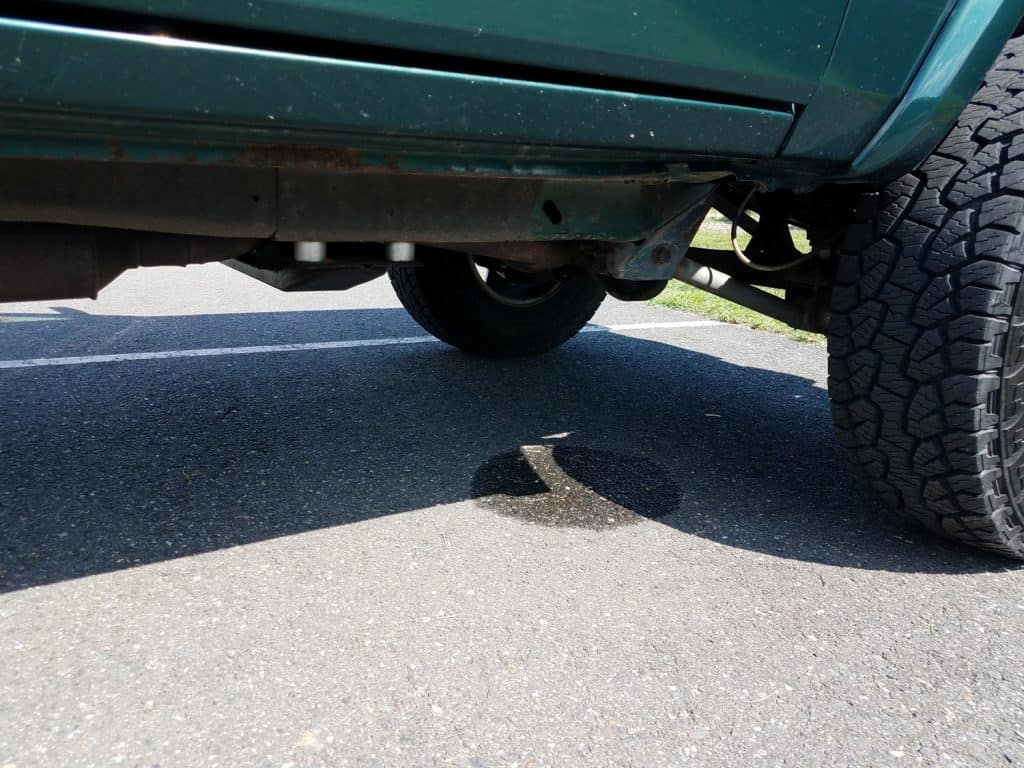
Alright, you've established that water is the liquid in question. That's actually great news compared to other types of leaks! Now we can really get into the details of what it is.
Water that drips from your vehicle is condensate. Your car AC and engine produce a large amount of condensation from the cooling mechanisms. On especially hot days or when running full blast, it can produce even more! This is a natural process.
Is it bad if your car is leaking water?
If you're not seeing huge amounts of water or experiencing other negative signs, it's not that worrisome.
High amounts of water could be a problem with your AC's drain pan. Sometimes, they rust and break. Alternatively, low refrigerant levels and dirty air filters can lead to condensate overflow.
However, it's a larger issue if the water is leaking on the interior of your car. This could mean the condensate drain is blocked or not attached properly. It's best to take care of that right away to avoid cosmetic damage.
Can you drive a car with a water leak?
There is no harm in driving your car if it has a pure water leak. We do recommend correcting the issue if your AC goes down completely or if the interior is getting wet. But the vehicle is still completely driveable without causing further damage by doing so.
On the other hand, oil or coolant leaks need to be repaired as soon as possible. Go ahead and get it in the shop to prevent larger problems down the road.
How do you stop a car engine from leaking water?
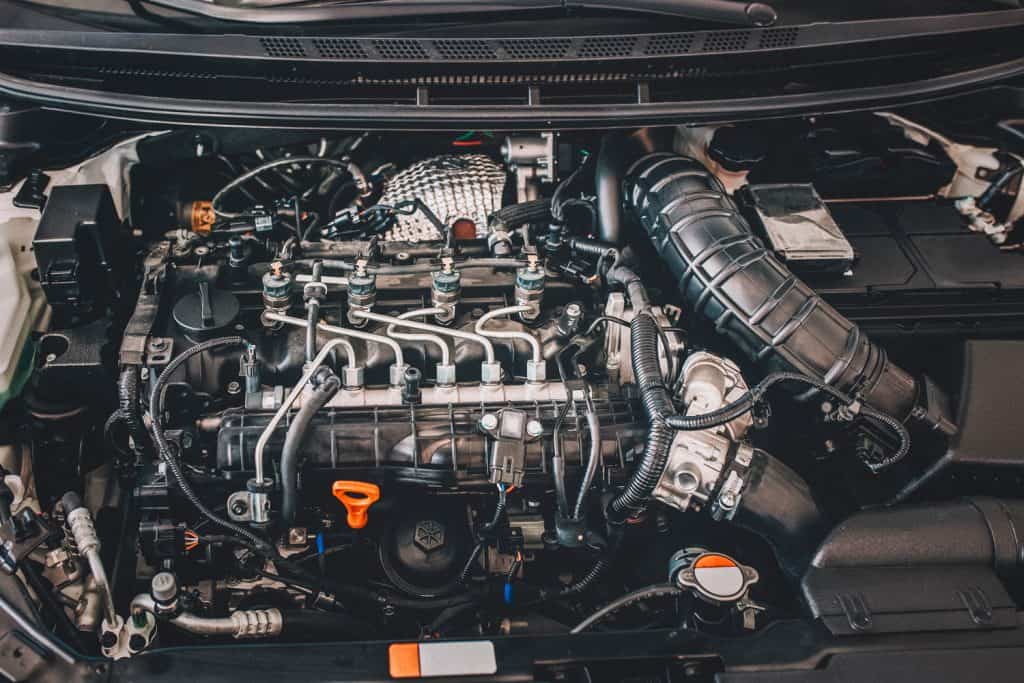
If your engine itself is dripping liquid, the radiator is often the culprit. However, it's not technically a water leak, as it contains a 50/50 mixture of coolant and water. As previously mentioned, any issues with coolants need immediate attention.
Radiators are subjected to consistently high temperatures and pressure, which makes them susceptible to cracking. This leads to leaks. In order to prevent the problem, it's important to have the engine regularly serviced. A professional will notice any rust, corrosion, or damage. Also, they'll flush the system for you before adding new fluid.
Does engine block sealer really work?
It's always a good idea to have a mechanic properly diagnose problems and make suggestions first. Block sealer is not always a permanent fix. It can be extremely helpful in minor cases but not severe ones.
That being said, once a radiator is already seeping, the best DIY action to take is to add a sealant. These products are designed to close leaks from the inside. Typically, they are delivered via the coolant passages of the vehicle. Then, the heat of the engine cures the seal.
They're available in liquid and powder forms and are simple to use. As a bonus, some brands act as a conditioner, too. Remember to follow the specific instructions given with the product you choose, as they can sometimes vary.
Click here to see Bar's Leak's Block Seal Liquid on Amazon.
Click here to see Bar's Leaks Radiator Stop Leak Tablets on Amazon.
On the road again
We're auto-ly hopeful that this post was helpful to you!
We've established that when a car drips water, it's normally just condensation from the AC or engine. This is benign unless there are other warning signs present, such as smoke or an interior leak. If you're dealing with coolant discharge, especially in the radiator, it needs to be addressed immediately. Engine sealer has its uses, but we suggest consulting with a professional as a first step.
Now get out there and enjoy your day!


